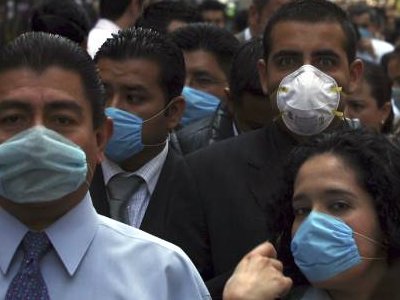UN urges countries to be prepared for more Swine Flu cases
 |
| There have been more than 440,000 laboratory confirmed cases of pandemic influenza H1N1 worldwide and over 5,700 deaths reported to WHO |
The United Nations health agency today reiterated that countries need to remain prepared for the H1N1(Swine Flu) virus, noting that the world has
not yet hit the peak influenza season between January and February when more cases are expected.
“It is completely expected that they will be seeing more influenza cases at this time, and that they will continue to see more,” Gregory
Hartl, spokesperson for the World Health Organization (WHO), told a news conference in Geneva.
An H1N1 update issued by the agency last week indicated that large parts of North America and parts of Europe are already over what WHO calls the
epidemic threshold, so there is substantial influenza activity and more is expected.
Mr. Hartl said the indication is that this will become widespread across the Northern Hemisphere and temperate zones as these areas move forward
through the late autumn and winter.
In a related development, WHO has deployed a team of experts to Ukraine, following a request from the Government, which has recorded more than 250,000
cases of influenza-like illness.
“As the pandemic virus has rapidly become the dominant influenza strain worldwide, it can be assumed that most cases of influenza in Ukraine are
caused by the H1N1 virus,” the agency said in a statement.
The team will begin initial work in the Lviv region, where reported numbers of cases showing severe manifestations of acute respiratory illness have
been especially high.
While many questions remain to be answered, WHO stated that the outbreak in Ukraine may be indicative of how the virus can behave in the Northern
Hemisphere during the winter season, particularly in health care settings typically found in Eastern Europe.
Despite concerns about the side effects of the H1N1 vaccine, WHO said it remains one of the best tools available to fight the virus.
“It has already been administered to hundreds of thousands of people. And so far we have not seen any severe side effects, and the number of
side effects or adverse events, as we would call them, from this vaccine is in line with what we would expect from a seasonal flu vaccine,” said
Mr. Hartl.
“Remember this vaccine is no different from any other vaccine in the sense that all vaccines will on rare occasions produce adverse
events,” he noted, pointing out that the advantages of getting vaccinated far outweigh the risks at this point.
As of 25 October, there have been more than 440,000 laboratory confirmed cases of pandemic influenza H1N1 worldwide and over 5,700 deaths
reported to WHO.
